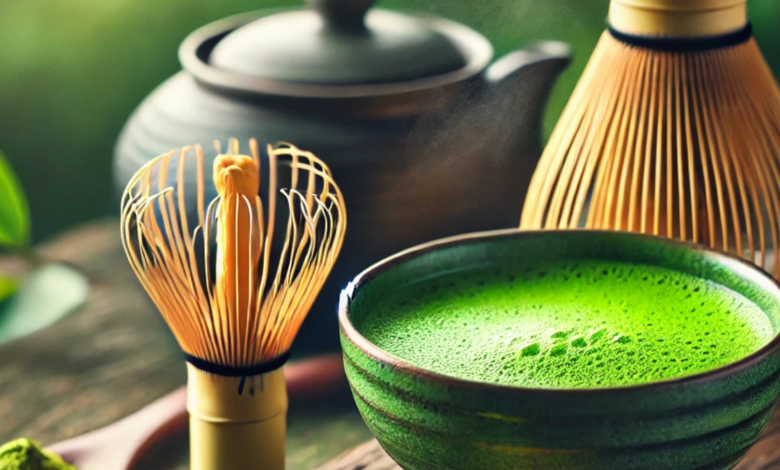Does Matcha Have Caffeine? Exploring the Buzz Behind the Green Elixir

Introduction
Does Matcha Have Caffeine, the vibrant green tea powder that has taken the world by storm, is often lauded for its numerous health benefits and unique flavour profile. However, a common question persists: Does matcha contain Does Matcha Have Caffeine? For many, understanding the caffeine content of their favourite beverages is vital to maintaining a balanced lifestyle. Whether you’re looking to switch from coffee or are curious how matcha might fit into your daily routine, this article will unravel the mysteries surrounding matcha’s Does Matcha Have Caffeine content.
Does Matcha Have Caffeine is not just a trendy drink; it’s a centuries-old tradition rooted in Japanese culture. Its preparation, health benefits, and calming effects have made it a staple for tea enthusiasts worldwide. By the end of this article, you’ll have a deeper understanding of matcha’s caffeine levels and why it has become a popular choice for those seeking energy and tranquillity.
Understanding Matcha: Origins and Composition
What Is Matcha?
Matcha originates from Japan and is made from the same Camellia sinensis plant as traditional green tea. However, the process of creating matcha sets it apart. The tea plants are shade-grown for several weeks before harvesting, which boosts the chlorophyll content and gives matcha its characteristic green colour. Once harvested, the leaves are steamed, dried, and ground into a fine powder.
Matcha’s preparation process ensures you consume the entire tea leaf rather than just an infusion. This results in a concentrated source of nutrients, antioxidants, and caffeine. Compared to regular green tea, matcha offers a more potent dose of its beneficial compounds.
Key Components of Matcha
Matcha is a powerhouse of health-boosting ingredients. It contains catechins, particularly epigallocatechin gallate (EGCG), known for their antioxidant properties. Additionally, matcha is rich in amino acids, with L-theanine being the standout. This compound enhances flavour and contributes to matcha’s calming effects.
Caffeine is one of matcha’s many components and plays a significant role in matcha’s appeal. Combined with L-theanine, the caffeine in matcha provides a smoother, more sustained energy boost than coffee.
Caffeine in Matcha: A Detailed Analysis
How Much Caffeine Does Matcha Have?
On average, a single serving of matcha (approximately one teaspoon or two grams) contains about 70 milligrams of caffeine. While this is less than the caffeine content of a typical cup of coffee, which ranges from 95 to 200 milligrams, it’s higher than the Does Matcha Have Caffeine content of regular green tea. The exact amount can vary based on factors like the quality of the matcha and the serving size.
The Role of L-Theanine
What sets matcha apart from other caffeinated beverages is the presence of L-theanine. This amino acid moderates the absorption of caffeine, leading to a state often described as “calm alertness.” Unlike the jittery energy spikes associated with coffee, matcha’s caffeine release is steady and sustained, making it a favourite for those seeking focus and clarity.
Factors Influencing Caffeine Levels
Not all matcha is created equal. The grade of matcha—ceremonial or culinary—affects its caffeine content. Ceremonial-grade matcha, made from younger tea leaves, tends to have a higher concentration of caffeine. Additionally, brewing methods, water temperature, and steeping time can influence the caffeine levels in your cup.
Health Benefits and Drawbacks of Matcha’s Caffeine
Health Benefits
Does Matcha Have Caffeine, paired with L-theanine, provides a balanced energy boost that enhances focus and reduces stress. It’s an excellent choice for tasks requiring prolonged concentration, such as studying or creative work. Moreover, combining caffeine and antioxidants can help boost metabolism and support weight loss efforts.
The antioxidants in matcha, particularly EGCG, protect against oxidative stress and may lower the risk of chronic diseases. Regular matcha consumption is also linked to improved heart health, cognitive function, and mood.
Potential Drawbacks
While matcha offers numerous benefits, it’s not without its potential drawbacks. Overconsumption of matcha can lead to caffeine-related side effects such as insomnia, increased heart rate, or digestive discomfort. Those sensitive to caffeine should consume matcha in moderation and avoid drinking it too late.
It’s also worth noting that matcha’s concentration means that consuming large quantities can lead to a higher intake of certain compounds, such as tannins, which might upset sensitive stomachs.
Matcha as a Coffee Alternative

Why People Switch to Matcha
For many, matcha serves as a healthier alternative to coffee. Its lower caffeine content reduces the likelihood of jitters or energy crashes. Additionally, the added health benefits, such as antioxidants and improved focus, make it a more appealing choice for those seeking a balanced lifestyle.
Use Cases
Matcha is incredibly versatile. In addition to traditional preparation, it can be used to make matcha lattes, smoothies, and even baked goods. This versatility allows individuals to incorporate matcha into their daily routines creatively.
Choosing the Right Matcha
To enjoy matcha’s full benefits, it is crucial to select a high-quality product. Look for ceremonial-grade matcha for drinking and culinary-grade matcha for cooking. Trusted brands and certifications can help you purchase authentic matcha free of additives.
Conclusion
Does Matcha Have Caffeine moderate caffeine content packs a punch thanks to its unique combination with L-theanine. This dynamic duo provides a steady and calming energy boost, making matcha an excellent choice for those looking to balance energy and tranquillity. Whether switching from coffee or exploring new beverages, matcha offers many benefits.
FAQs
- Does matcha have more caffeine than coffee?
- Matcha typically contains less caffeine than coffee but more than regular green tea.
- Can matcha be consumed by people sensitive to caffeine?
- Yes, but it’s best consumed in moderation due to its concentrated nature.
- Is it safe to drink matcha every day?
- For most people, daily consumption of matcha is safe and beneficial. However, moderation is key.
- How does matcha’s caffeine affect sleep?
- Consuming matcha too late in the day may interfere with sleep due to its caffeine content.
- What’s the best time of day to drink matcha for energy?
- Morning or early afternoon is ideal to enjoy its energizing effects without disrupting sleep.
You May Also Read: https://latestcryptonewz.com/epstein-list-twitter/



